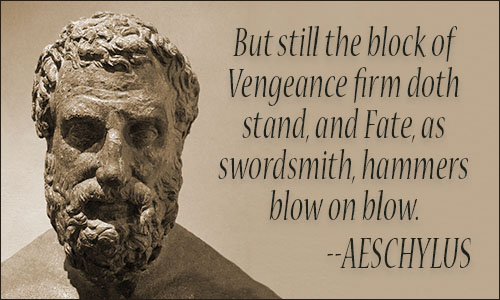AESCHYLUS QUOTES III
Greek dramatist (525 B.C.-456 B.C.)

Notice: Undefined variable: id in /hermes/walnacweb03/walnacweb03ak/b2149/pow.notablequote/htdocs/a/includes/quoter.php on line 25
The cure is in the house, not brought by other hands from distant places, but by its own, in agony and blood.
AESCHYLUS
Notice: Undefined variable: id in /hermes/walnacweb03/walnacweb03ak/b2149/pow.notablequote/htdocs/a/includes/quoter.php on line 35
The Libation Bearers
Notice: Undefined variable: id in /hermes/walnacweb03/walnacweb03ak/b2149/pow.notablequote/htdocs/a/includes/quoter.php on line 61
Willingly no one chooses the yoke of slavery.
AESCHYLUS
Agamemnon
You'll see all other mortal sinners, the ones who flout the honor owed to gods or guests, or loving parents--you'll see them get the justice they deserve. For Hades holds men mightily to a strict accounting down below the earth; he sees all things, inscribes them within the book of his remembering.
AESCHYLUS
Eumenides
For in the voyage of the heart, there is a freight of hatred, and the wind of wrath blows shrill.
AESCHYLUS
The Libation Bearers
Oh, it is easy for the one who stands outside the prison-wall of pain to exhort and teach the one who suffers.
AESCHYLUS
Prometheus Bound
A prosperous fool is a grievous burden.
AESCHYLUS
fragment
Success is man's god.
AESCHYLUS
Choephorae
What house
would ask for Vengeance
to perch heavy,
defiling the rafters like some bird of ill omen?
AESCHYLUS
The Suppliants
For this our task hath Fate spun without fail to last for ever sure, that we on man weighed down with deeds of hate should follow till the earth his life immure. Nor when he dies can he boast of being truly free.
AESCHYLUS
The Eumenides
From a just fraud God turneth not away.
AESCHYLUS
fragment
The gods at will can shape a gladder strain, and from the lamentations at the graveside, a song of triumph may arise.
AESCHYLUS
The Libation Bearers
No man looks with love on deeds that to the high Gods hateful prove.
AESCHYLUS
The Libation Pourers
God's mouth knows not how to speak falsehood, but he brings to pass every word.
AESCHYLUS
Prometheus Bound
Ares ever loves to pluck all the fairest flower of an armed host.
AESCHYLUS
fragment, Europe
For there below ground sits the Dark God, strong to call men to judgment; he sees all, and writes it in his memory.
AESCHYLUS
The Eumenides
Fortune is for all, judgment is theirs who have won it for themselves.
AESCHYLUS
fragment
Verily a prosperous fool is a heavy load.
AESCHYLUS
fragment
The Sphinx, the Watch-dog that presideth over evil days.
AESCHYLUS
fragment, Sphinx
Too credulous a woman's longing flies
And spreading swiftly, swiftly dies.
AESCHYLUS
Agamemnon
For, alone of gods, Death loves not gifts; no, not by sacrifice, nor by libation, canst thou aught avail with him; he hath no altar nor hath he hymn of praise; from him, alone of gods, Persuasion stands aloof.
AESCHYLUS
fragment, Niobe